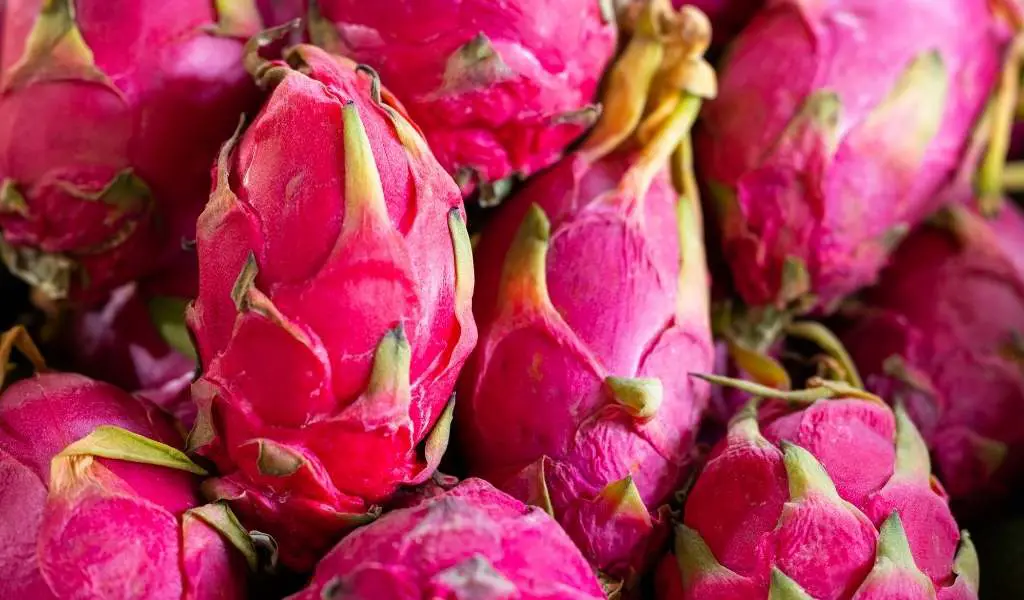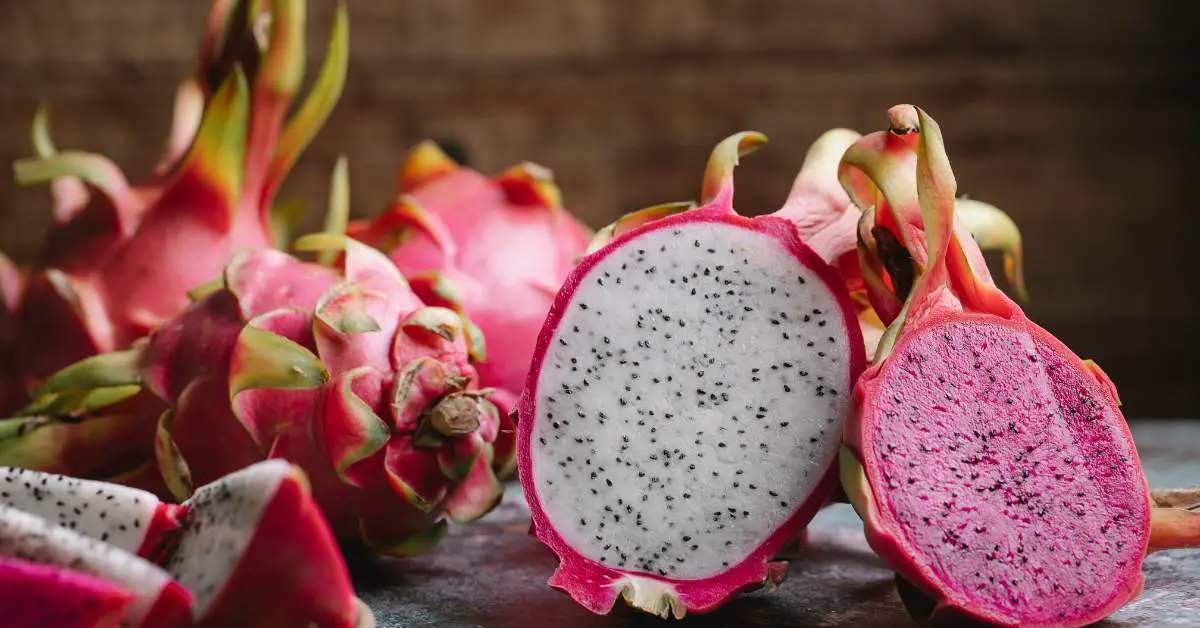Can you enjoy dragon fruit if you have histamine intolerance? Dragon fruit, also known as pitahaya or strawberry pear, is a tropical delight that has captured the hearts of many fruit enthusiasts worldwide. (3)
With its vibrant red skin and sweet, seed-speckled pulp, it’s no wonder this exotic fruit is growing in popularity. But if you have histamine intolerance, you should know about potential histamines in dragon fruit before adding it to your diet.
Is dragon fruit high in histamine? Here’s the short answer: Dragon fruit is a low-histamine fruit and is likely safe if you have histamine intolerance.
However, everyone responds a little differently to foods based on genetics, food preparation methods, the age of the food, and whether they have other food intolerances or sensitivities. So, let’s dig a little deeper.

Understanding Dragon Fruit and Histamine Levels
Before we dive into the histamine content of dragon fruit, let’s briefly explain histamine intolerance. Histamine intolerance is a condition where individuals are sensitive to histamine-rich foods, leading to various uncomfortable symptoms.
When someone has histamine intolerance, their body lacks sufficient levels of diamine oxidase (DAO), an enzyme that breaks down histamine in the digestive tract.
Without adequate DAO, dietary histamine isn’t properly metabolized and can be absorbed into the bloodstream. This causes histamine to reach tissues where it wouldn’t normally be present, triggering symptoms.
Reactions to excess histamine may include headaches, flushing, low blood pressure, irregular heartbeat, nausea, diarrhea, and asthma-like symptoms. Foods particularly high in histamine like aged cheeses, wine, smoked meats, pickles, and tomatoes commonly trigger problems in sensitive individuals.
Maintaining a low-histamine diet is key to controlling symptoms.
Assessing Dragon Fruit’s Histamine Content: Is it Safe to Eat?
So, the question arises: Does dragon fruit contain histamine or other biogenic amines? There’s no evidence that dragon fruit contains significant histamine or other biogenic amines.
One study that measured the amine content of various fruits found that dragon fruit contained only 0.02 mg/100 grams of biogenic amines, considered to be very low.The most abundant biogenic amine in dragon fruit was putrescine, which was present at a concentration of 0.01 mg/100 g. (6)
Fresh Dragon Fruit is Safest if You Have Histamine Intolerance
Choose dragon fruit in its fresh state, as bacteria associated with the ripening process may produce enough histamine to cause problems in overly ripe fruit. I would also avoid dried dragon fruit, as it contains preservatives that could cause a reaction for some people with food sensitivities, including histamine intolerance.
While natural dragon fruit appears to be a histamine-friendly choice, be vigilant about products that contain artificial dragon fruit flavoring. These synthetic additives can introduce uncertainty into the equation. We lack information about the exact flavoring used and whether it might contain histamine or trigger its production.
However, a crucial piece of advice is to exercise caution and consume dragon fruit in moderation, especially if you haven’t eaten it before or have severe histamine intolerance symptoms.
Consulting with a healthcare practitioner before making any significant dietary changes is always a wise decision. Always keep a food journal, so you can monitor for histamine intolerance symptoms when you introduce a new food.

Is Dragon Fruit Beneficial for Histamine Intolerance?
Beyond being low in histamine, this tropical superfruit contains an array of antioxidants and anti-inflammatory compounds that may promote wellness in various ways.
Several studies show that dragon fruit has high antioxidant activity. Antioxidants protect cells by counteracting unstable molecules called free radicals, which can damage DNA and cell membranes if left unchecked. The antioxidants in dragon fruit include vitamin C, carotenoids called betacyanins and betaxanthins, and polyphenols. (2)
Plus, dragon fruit is rich in anthocyanidins, compounds with antioxidant and anti-inflammatory properties. (1) These may help neutralize free radicals and lower oxidative stress on the body.
Dragon Fruit’s Anti-Inflammatory Power: Benefits for Histamine Intolerance?
In addition to antioxidant effects, investigations have revealed dragon fruit’s anti-inflammatory properties. Inflammation underlies many chronic diseases and causes pain symptoms. Betalain pigments, also in dark purple fruits and vegetables such as beets, reduce inflammatory markers in animal studies.
While human clinical trials are needed, this preliminary research suggests that regularly consuming compounds with anti-inflammatory activity could help alleviate inflammatory conditions like arthritis. (5)
While concrete evidence is still limited, some sources speculate dragon fruit may also offer antihistamine benefits due to its anti-inflammatory effects. Histamines are immune molecules implicated in allergic responses that can trigger swelling and itchiness.
By reducing inflammation, dragon fruit may indirectly help provide relief from histamine-related allergy symptoms. However, more targeted research is required to confirm this proposed benefit.
Still, dragon fruit is packed with essential nutrients, antioxidants, and anti-inflammatory compounds that may bolster immunity, support healthy cells, and ease inflammatory conditions. Because dragon fruit is low in histamine, it’s also safe for most people with histamine intolerance, barring other food sensitivities and intolerances.
Dragon Fruit and Histamine Tolerance – What Science Says
Is dragon fruit low in histamine? This lovely purple fruit is low in histamine and other biogenic amines. From my experience treating patients with histamine intolerance, people tolerate it well.
But remember that individual tolerance can vary, and it’s always prudent to consult with a healthcare practitioner before making significant dietary changes.
Now, discover other fruits that high in histamine.
References:
- Chaiyasut, C., Sivamaruthi, B.S., Pengkumsri, N., Sirilun, S., Peerajan, S., Chaiyasut, K., & Kesika, P. (2016). ANTHOCYANIN PROFILE AND ITS ANTIOXIDANT ACTIVITY OF WIDELY USED FRUITS, VEGETABLES, AND FLOWERS IN THAILAND. Asian Journal of Pharmaceutical and Clinical Research, 9, 218-224. https://journals.innovareacademics.in/index.php/ajpcr/article/view/14245
- Harni, M., Anggraini, T., Rini, & Suliansyah, I. (2023). The extraction effect of the skin of dragon fruit (Hylocereus polyrhizus) to its phenolic compounds and its antioxidants: A review. IOP Conference Series: Earth and Environmental Science, 1200. https://iopscience.iop.org/article/10.1088/1755-1315/1200/1/012034
- Morillo AC, Mora MS, Morillo Y. Analysis of the genetic diversity of Dragon fruit based on ISSR markers in Colombia. Braz J Biol. 2022 Jan 21;82:e256451. doi: 10.1590/1519-6984.256451. PMID: 35081251.
- Magrone T, Magrone M, Russo MA, Jirillo E. Recent Advances on the Anti-Inflammatory and Antioxidant Properties of Red Grape Polyphenols: In Vitro and In Vivo Studies. Antioxidants (Basel). 2019 Dec 31;9(1):35. doi: 10.3390/antiox9010035. PMID: 31906123; PMCID: PMC7022464. https://pubmed.ncbi.nlm.nih.gov/31906123/
- Bañuls-Mirete M, Ogdie A, Guma M. Micronutrients: Essential Treatment for Inflammatory Arthritis? Curr Rheumatol Rep. 2020 Oct 26;22(12):87. doi: 10.1007/s11926-020-00962-z. PMID: 33104882; PMCID: PMC8078476. https://pubmed.ncbi.nlm.nih.gov/33104882/
- Linares, D. M., del Rio, B., Redruello, B., Ladero, V., Martin, M. C., Fernandez, M., & Alvarez, M. A. (2016). Biogenic amines in plant-origin foods: Are they frequently underestimated in low-histamine diets?. Foods, 5(4), 77. https://doi.org/10.3390/foods5040077.


